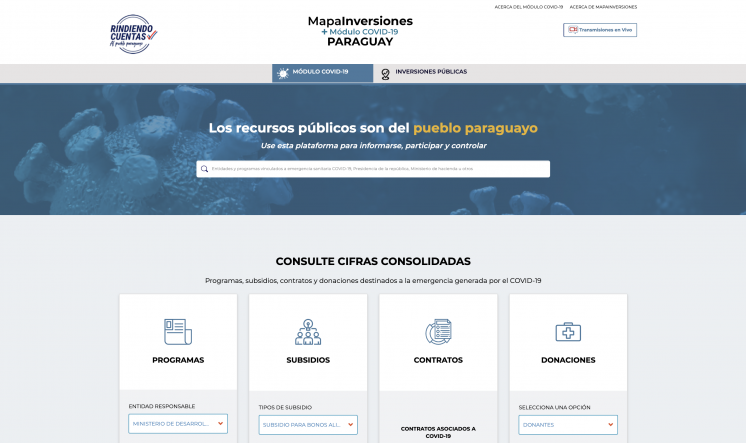
Beyond COVID-19: Building resilient and accountable extractives governance
Why transparency matters for resource-rich countries caught in a triple crisis
In resource-rich developing countries, sharp decreases in extractives revenues are coinciding with intense and urgent healthcare spending priorities. Earlier this week an expert panel, moderated by EITI Chair Rt. Hon Helen Clark, discussed the implications of the COVID-19 pandemic, and how transparency can help countries navigate its challenges.
The economic shockwaves from the COVID-19 pandemic are being acutely felt by resource-dependent countries. While many governments are scrambling to avoid economic collapse, the virus is here to stay – and must be taken seriously. This was the message emphasised by David Nabarro, Special Envoy of the WHO Director General on COVID-19, in his opening remarks at an EITI webinar this week. The webinar was the second event in the EITI’s "Transparency Matters" series.
Counting the cost
Living and working with the virus will inevitably be more costly. Production costs may increase as a result and companies will need to factor these costs into their projections. Employees in mining, oil and gas operations often work and live in close physical proximity. Extractives operations are frequently hosted in countries where public health systems are under pressure and where revenues are needed the most.
Nabarro stressed the importance of good quality community health. As economic activity restarts, the need to conserve health is often balanced against the need to restart economic activity. This trade-off is untenable, and it is important that employers – including those in extractives – advocate a more sustainable approach, argues Nabarro. “Without good quality public health to keep people safe, there is no real prospect of reopening the economy.”
Governance risks
The pandemic has brought into focus many governance risks related to the extractives sector. These were underlined by the EITI’s Executive Director, Mark Robinson. For example, commodity trades undertaken under pressure may be more vulnerable to corruption and erode revenue streams. In some countries, revenue shares allocated to regional governments may equal up to 50% of total extractives revenues. These revenue flows may be reduced as governments revise their budgets to address public sector health needs. Local communities may suffer from reduced expenditures as a result. Transparent management can help record these variations and keep dialogue open with civil society and communities.
To better support EITI implementing countries report data that is timely and relevant in response to the crisis, the EITI has introduced new flexible reporting measures. These are designed to allow implementing countries to retain the momentum of the EITI process, while adapting to local circumstances and urgent information needs.
Managing oil price volatility in Nigeria
In Nigeria, up to 50% of government revenue and 80% of export revenue are derived from the oil and gas sector. The recent fall in oil prices has had a massive impact on public finances, with government revenues projected to shrink by 45% and GDP expected to contract 3.2%, according to the World Bank. In anticipation of its worst economic crisis in 40 years, the government has responded swiftly by revising its budget and adopting fiscal measures.
Yet according to Waziri Adio, Executive Secretary of the EITI in Nigeria (NEITI), the crisis has thrown into sharp relief the broader and more deep-rooted issue of resource dependence and volatility. “It is very clear that we need to look beyond the moment – we need to interrogate why Nigeria is vulnerable and why we are in this crisis,” said Adio. With price volatility an ongoing feature of the oil market, NEITI is advocating longer-term measures to limit Nigeria’s dependence on oil, for example by saving oil revenues and diversifying its government revenues. NEITI will be issuing a policy brief in the coming weeks on this subject.
Public information systems in Paraguay
From the perspective of the Latin American and Caribbean region, Roberto de Michele, a specialist at the Inter-American Development Bank, warned against the high toll that corruption may exert. Research indicates that up to 20% of funds intended for crisis response may never reach their intended destination.

The Government of Paraguay established a platform which tracks programmes, grants, contracts and donations dedicated to mitigating the impacts of COVID-19. Source: rindiendocuentas.gov.py
Yet experience from Paraguay, which does not implement the EITI, demonstrates that transparency can be achieved swiftly and effectively. In less than three months, its government established a platform to track the allocation of funds to the crisis, including the disclosure of all awarded contracts. Other countries in the region intend to follow suit.
Business no longer as usual
As de Michele reminded us, “necessity is the mother of invention.” The COVID-19 pandemic may serve as a catalyst for many resource-dependent countries to evaluate their reliance on the sector and the way it is managed. This week’s webinar offered some insights into how it might help shape resilient and accountable governance. Examples from Africa and Latin America offer hope that more resilient and accountable governance models can be developed in resource-rich countries facing intense pressures from the crisis. But responsible and sustainable responses will require innovation, collaboration, transparency and swift action.
The Transparency Matters series continues in September with an event on the opportunities and challenges relating to resource-backed loans to governments and state-owned enterprises. Up for discussion is the importance of transparency on these loans for sustainable and accountable debt management.



